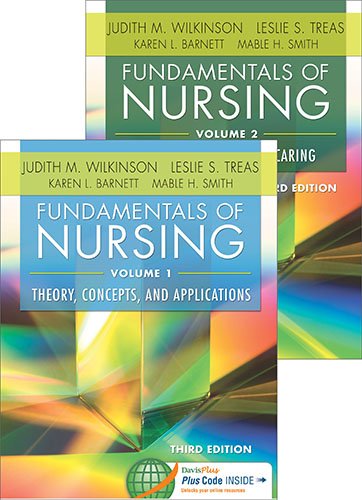In Stock
Fundamentals Nursing Vol 1 3rd Edition By Wilkinson Treas – Test Bank
Fundamentals of Nursing: Vol. 1, 3rd Edition by Wilkinson and Treas offers a comprehensive introduction to nursing fundamentals. Buy this edition to explore essential concepts, practical skills, and updated practices critical for effective nursing care and professional development.
Digital item No Waiting Time Instant DownloadISBN-10: 9780803640771 ISBN-13: 978-0803640771Authors: Judith M. Wilkinson, Leslie S. Treas,Karen L. Barnett, Mable H. SmithPublisher : F.A. Davis Company; 3rd edition
Original price was: $55.00.$25.00Current price is: $25.00.
Fundamentals Nursing Vol 1 3rd Edition By Wilkinson Treas – Test Bank
Chapter 2. Critical Thinking & Nursing Process
MULTIPLE CHOICE
1. Which of the following characteristics do the various definitions of critical thinking have in common? Critical thinking:
|
a) |
Requires reasoned thought |
|
b) |
Asks the questions “why” or “how” |
|
c) |
Is a hierarchical process |
|
d) |
Demands specialized thinking skills |
ANS: A
The definitions listed in the text as well as definitions contained in Box 2-1 state that critical thinking requires reasoning or reasoned thinking. Critical thinking is neither linear nor hierarchical. The steps involved in critical thinking are not necessarily sequential, wherein mastery of one step is necessary to proceed to the next. Critical thinking is a purposeful, dynamic, analytical process that contributes to reasoned decisions and sound contextual judgments.
(High-level question, answer not stated verbatim)
Nursing Process: Not applicable
Client Need: Safe and Effective Care
Cognitive Level: Analysis
Difficulty: Moderate
PTS: 1
2. A few nurses on a unit have proposed to the nurse manager that the process for documenting care on the unit be changed. They have described a completely new system. Why is it important for the nurse manager to have a critical attitude? It will help the manager to:
|
a) |
Consider all the possible advantages and disadvantages |
|
b) |
Maintain an open mind about the proposed change |
|
c) |
Apply the Nursing Process to the situation |
|
d) |
Make a decision based on past experience with documentation |
ANS: B
A critical attitude enables the person to think fairly and keep an open mind.
Nursing Process: Not applicable
Client Need: Safe and Effective Care
Cognitive Level: Comprehension
Difficulty: Moderate
PTS: 1
3. The nurse has just been assigned to the clinical care of a newly admitted patient. To know how best to care for the patient, the nurse uses the Nursing Process. Which step would the nurse probably undertake first?
|
a) |
Make an assessment |
|
b) |
Make a diagnosis |
|
c) |
Plan outcomes |
|
d) |
Plan interventions |
ANS: A
Assessment is the first step of the Nursing Process. The nursing diagnosis is derived from the data gathered during assessment, outcomes from the diagnosis, and interventions from the outcomes.
Nursing Process: Assessment
Client Need: Safe and Effective Care
Cognitive Level: Application
Difficulty: Easy
PTS: 1
4. Which of the following is an example of practical knowledge? Assume all are true.
|
a) |
The tricuspid valve is located between the right atrium and ventricle of the heart. |
|
b) |
The pancreas does not produce enough insulin in type 1 diabetes. |
|
c) |
When assessing the abdomen, you should auscultate before palpating. |
|
d) |
Research shows pain medication given intravenously acts faster than medication given by other routes. |
ANS: C
Practical knowledge is knowing what to do and how to do it, such as how to make an assessment. The others are examples of theoretical knowledge, anatomy (tricuspid valve), facts (type 1 diabetes), and research (intravenous pain medication).
(High-level question, answer not stated verbatim)
Nursing Process: Not applicable
Client Need: Safe and Effective Care
Cognitive Level: Application
Difficulty: Moderate
PTS: 1
5. Which of the following is an example of self-knowledge? The nurse thinks, “I know that I:
|
a) |
Should take the client’s apical pulse for 1 full minute before giving digoxin” |
|
b) |
Should follow the client’s wishes even though it is not what I would want” |
|
c) |
Have religious beliefs that may make it difficult to take care of some clients” |
|
d) |
Need to honor the client’s request not to discuss his health concern with the family” |
ANS: C
Self-knowledge is being aware of your religious and cultural beliefs and values. Taking the pulse is an example of practical knowledge. Following client wishes and honoring client requests are examples of ethical knowledge.
(High-level question, answer not stated verbatim)
Nursing Process: Not applicable
Client Need: Safe and Effective Care
Cognitive Level: Application
Difficulty: Difficult
PTS: 1

Reviews
There are no reviews yet.